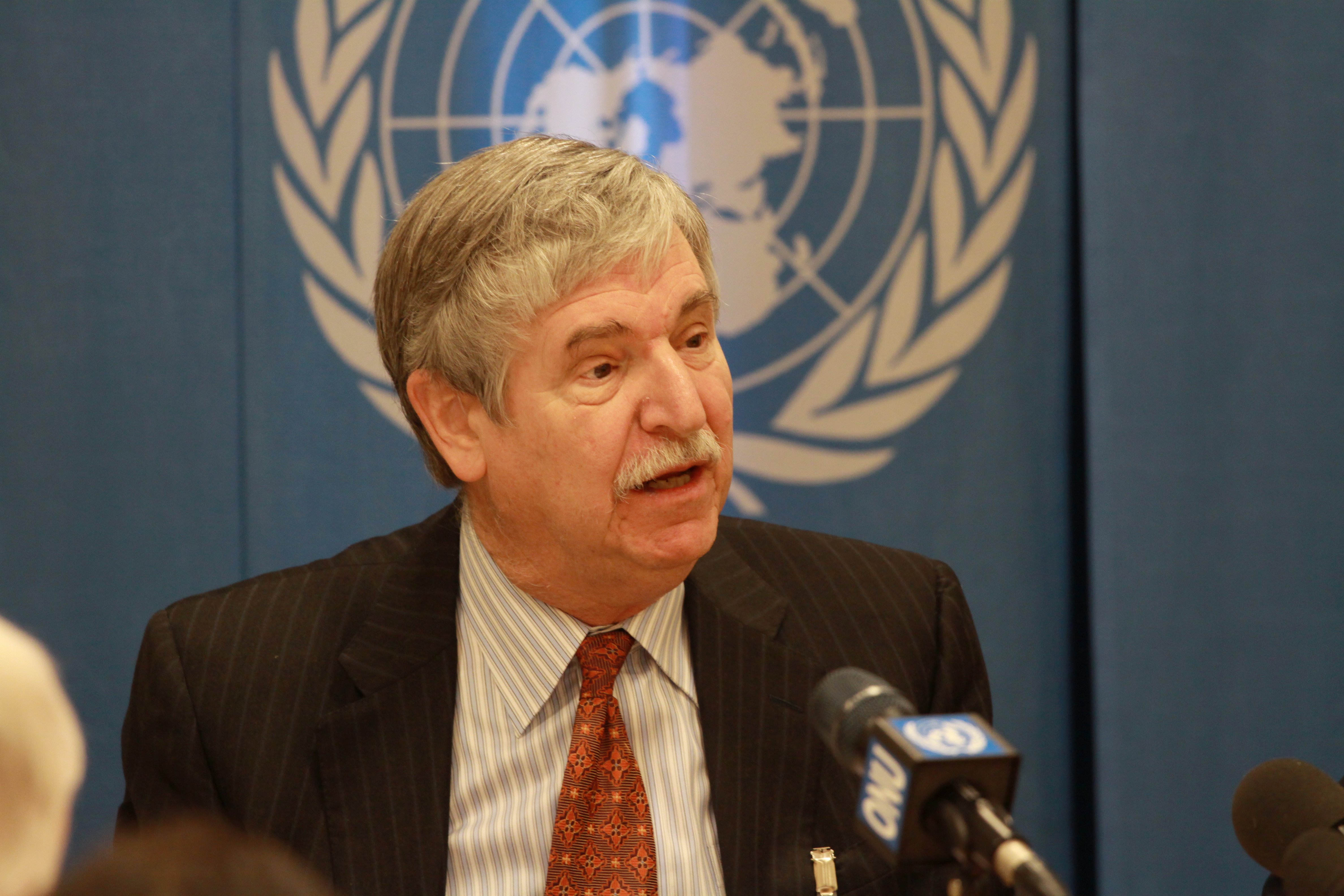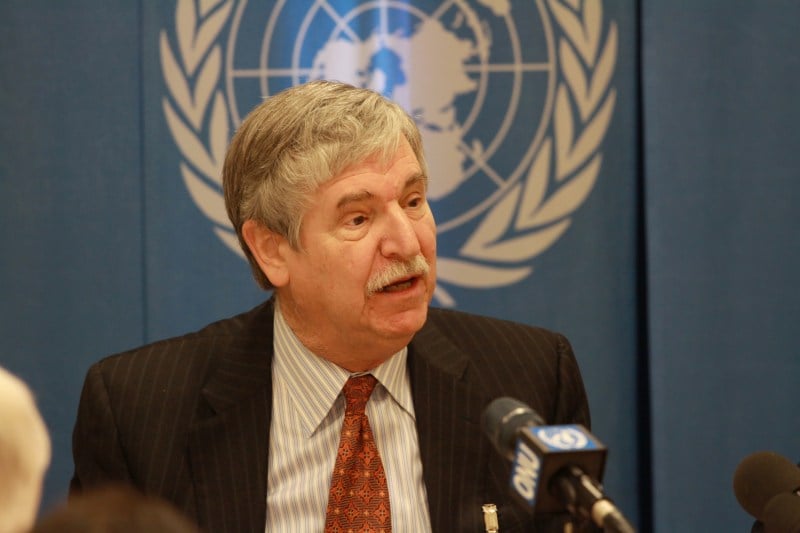On March 9, Ambassador John Limbert, formerly a deputy assistant Secretary of State and a senior diplomat, sat down with The Daily to talk about his life in the Foreign Service. Held captive for 444 days in the 1979 Iran hostage crisis, Limbert spoke during his ordeal with then-Iranian Deputy Defense Minister Ali Khamenei, who has since become Iran’s Supreme Leader. Here, he talks about Argo, his ordeal as a hostage in Iran and what he believes are the necessary steps for the United States to engage Iran.
The Stanford Daily (TSD): Okay, softball question. What did you think of Argo?
Ambassador John Limbert (JL): Oh, I liked it a lot. It had all the elements of a good movie, it was suspenseful, it had Hollywood satire and comedy, it had incompetent American bureaucrats, it had bad Middle Easterners, it had good Middle Easterners, it had friendly Canadians… all of the things that make up a good movie.
TSD: Before the Iran hostage crisis in November [1979], the American embassy in Tehran was overrun in February 1979. Can you describe what it was like, when relations were poor and everyone knew it, to see hundreds of Iranians mobbing the embassy?

JL: I was not there at the time, but a group [of armed leftists] attacked the embassy on Feb. 14, only about three days after the final collapse of the Shah’s government. Fortunately, no one was hurt, though there was a lot of shooting, and what passed for the Iranian [provisional] government at the time did react — they did send in a force, a militia if you’d like, that threw out the attackers. Then, of course, this militia established themselves as our security force. For better or worse, they were the security force that we had for about the next six or seven months.
TSD: After the embassy was overrun in February, it became clear that the U.S. saw its embassy in Tehran as threatened. Personnel were pulled out, but no extra security came. As a hostage, how did you make peace with the fact that the U.S. knew the embassy was under threat but didn’t do more to secure it?
JL: It’s a good question, and it’s a question that people still talk about. In July of ‘79, Secretary of State [Cyrus Vance] sent a message to the chief of mission in Tehran, about three or four weeks before I arrived, and he says, “There’s a lot of pressure to bring the Shah [Mohammad Reza Pahlavi] to the United States. What are your views?” His response is quite clear: “Right now, under [revolutionary] conditions, it’s not the right thing to do…” That message was exactly right, and Cyrus Vance, as I understand the story, he used this reply to argue against admitting the Shah when there was pressure, notably from [banker and philanthropist] Dave Rockefeller and [former Secretary of State] Henry Kissinger.
[That changed in] October [1979, when] President Carter and the government learn for the first time that the Shah is sick with cancer in Mexico and that he needs to come immediately to the United States for treatment. That changes the whole equation.
TSD: Really? But why would they admit the Shah?
JL: Of course, the reasons that the embassy had cited in July were still valid in October… According to some accounts, President Carter was told that if [the Shah died], he would be politically vulnerable because people are going to say that one, he lost Iran, and, two, he sat and did nothing and let the Shah die. Now Carter — remember, this is October of ’79 — is facing an election in one year, and things don’t look good. In 1979, the economy was bad: What I tell my students is that President Carter’s approval rating and the inflation rate were at about the same level.
Others, notably National Security Adviser [Zbigniew] Brzezinski, argued that the shah has been an ally for 25 to 30 years and we couldn’t just abandon him as no one else is going to take him. You have arguments on both sides. What I think turned the issue was Cyrus Vance. He switched positions. He had been opposed to admitting the Shah like the President was, but after he learned of the illness, he switched his position.
TSD: You’ve lived and worked in Iran; you speak fluent Farsi. What do Iranians think of Americans today?
JL: Most Iranians that I know do not wake up first thing in the morning and think about the United States. Same with Americans. It’s not what most of our countrymen think about. I know it’s hard for us to accept the fact that we are not at the center of everyone else’s life. But we’re not.
We have not talked to each other as states for 33 years, and each side looks at the other and exaggerates and distorts both the other’s intentions and capabilities. And not having any diplomatic representation, both sides go to the worst-case scenario. If the Iranians buy a shipment of truck parts, it’s somehow related to their nuclear programs. If we rotate some of our ships, it somehow becomes a part of an invasion of Iran.
TSD: So how does the U.S. engage Iran?
JL: The first thing is [to] calm down. You hear politicians refer to the threat from Iran. You hear a certain presidential candidate say, for example, Iran needs access to Syria to gain access to the sea. But something’s wrong. Something’s wrong with that. Don’t they teach geography at Harvard Business School? But this is from somebody who wants to be President of the United States. So the first thing is [to] take a deep break, back off and ask yourself, what is this talk really about?
TSD: A lot of people would argue that it’s about Israel and Israeli security.
JL: If I were an Israeli and I heard about us being erased off the pages of time, I wouldn’t take very well to that. But the interesting thing is that Iran has become an issue of very sharp and pointed debate within Israel. Israelis themselves are not united over what the relationship should be, what the real threat is, what we should be worried about. It’s not just the academics, like us, not just the negotiators and diplomats, but people with strong security and intelligence backgrounds. And they are saying, no, we need to be a bit more measured.
If I were a right-wing politician from Israel, my biggest ally would be [Iranian] President [Mahmoud] Ahmadinejad. I would send him a check every month to keep him talking the same way. For the far right in Israel, he’s the gift that keeps on giving.
TSD: So you’re saying that radical statements by groups like Hamas and states like Iran are almost advantageous to politicians in Israel because it sort of shores up the conservative right wing support?
JL: Sure. You keep beating the drums and say “Iran this, Iran that, vote for me because I’m the best protection against the crazy people out here.” A lot of Iranians know that. If you noticed back in the [Iranian] presidential campaign in 2009, Ahmadinejad came under a lot of criticism for a lot of needlessly provocative statements from his opponents, not that they were friends of Israel, but they criticized him for political incompetence, if you’d like, for making statements that did not serve the interests of their own country.
TSD: Sure, cooler heads may prevail, but what if they don’t? What do you do when diplomacy fails?
JL: Diplomacy doesn’t fail — you just need patience. [We’ve had] 32 years now of estrangement, and relations are very bad. The view of each other is very bad. A two-week moratorium on criticism or a one-month moratorium isn’t going to change that.
These things do not vanish overnight with one statement, one meeting and one message. What you have to do is not give up, because there will be setbacks. But the worst thing you can do is [to] throw your hands up. Why is it that the other side is always intransigent, and we are always reasonable?
TSD: Did you feel betrayed by your government when you were a hostage in Iran for 444 days?
JL: I don’t know if I would use the word betrayed. I understand the reasons that President Carter made the decision that he did. I wish he hadn’t, but he did. The message to us was, “You are expendable. We have reasons for doing what we’re doing, and your job is to carry on.”
This interview has been condensed and edited.
